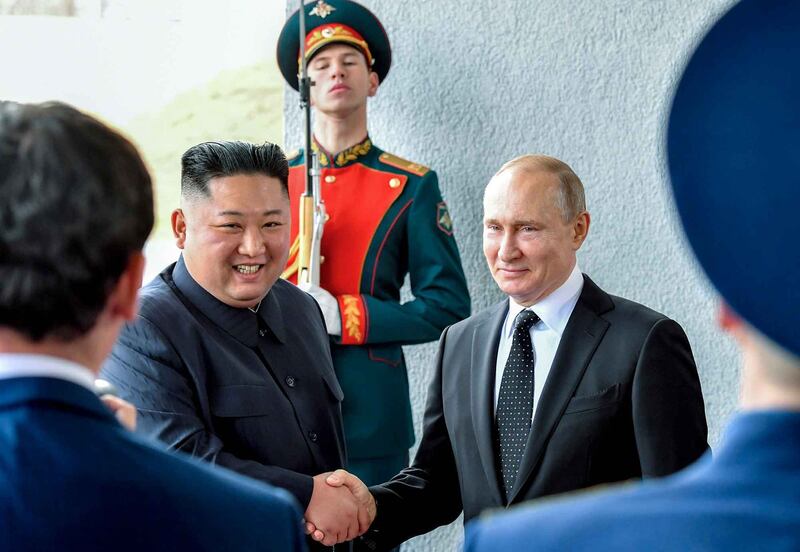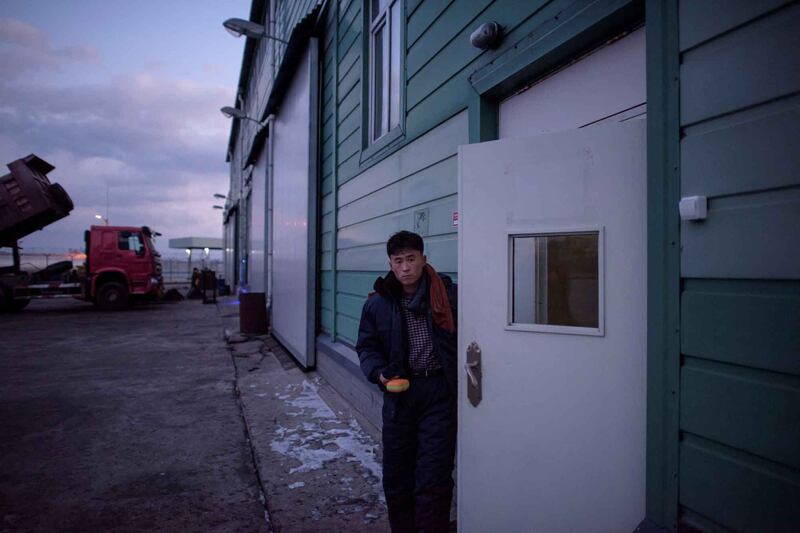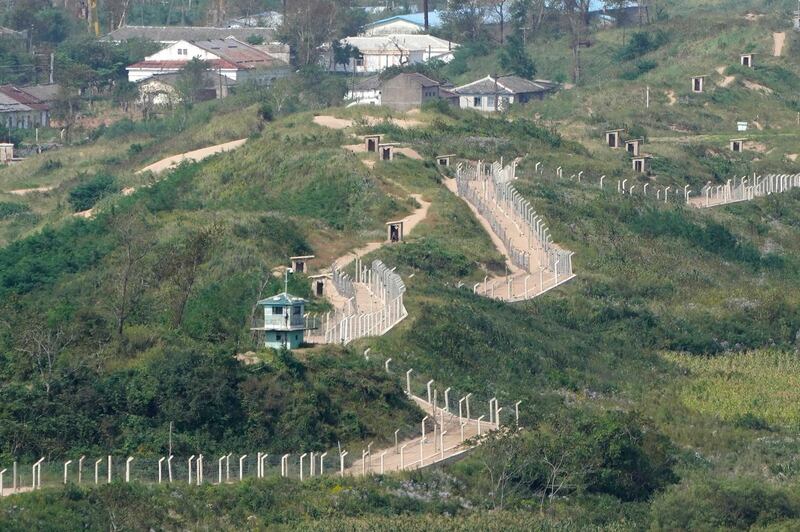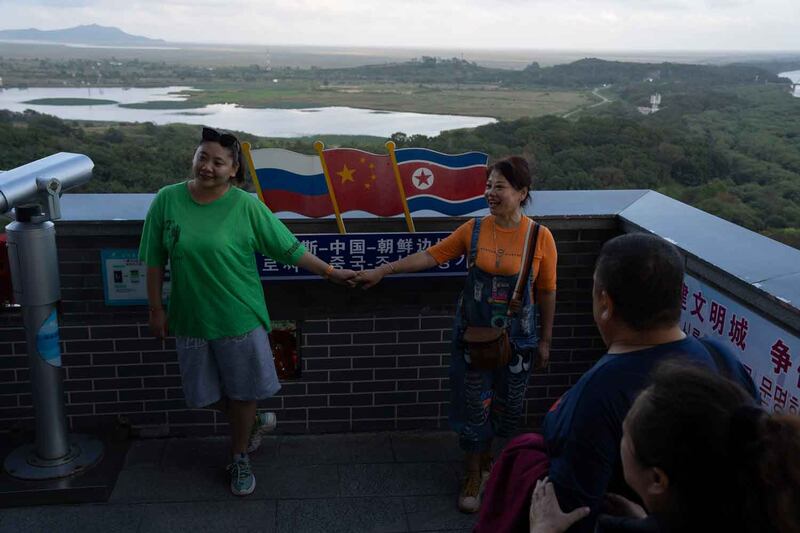>>> For more on this topic, read the complete Bear East series here.
The armored train trundled into the far eastern Russian region of Primorsky Krai after a marathon journey as North Korean leader Kim Jong Un made his first foreign trip in four years. Within hours of his Sept. 10 arrival, Kim was clinking champagne glasses with President Vladimir Putin at a hub of Russia’s space program, amid speculation that North Korea would be trading desperately needed weaponry to Moscow in return for missile and rocket technology.
To most of the watching world, this was a summit of two outcast leaders, united by their international isolation. And even for many Russians, it was an outlandish spectacle. Within 15 minutes of the Russian RBK media group posting a video of Kim disembarking from his train to an honor guard, its Telegram channel lit up with hundreds of reactions from readers, half of them with clown face emojis.
Andrei Lankov, a Seoul-based Russian author and lecturer who has spent many years studying North Korea, said despite the Soviet-era ties between Moscow and Pyongyang, there’s also a disconnect between them.
“For the Russians, North Korea is a very exotic and frankly very bizarre, even comic place with a crazy personality cult that the average Russian person probably doesn’t really respect,” he said.
As Russia’s military struggles for ascendancy in its war in Ukraine, it has no diplomatic supporter as staunch as North Korea. Their ties are rooted in the history of the Soviet Union, which was instrumental in the creation of the North as a communist state after World War II. South Korea’s spy agency says that Russia has even proposed a trilateral naval exercise with China and North Korea. If that happened, it would be the first joint military drills that the North has held with any foreign country.
And yet, North Korea-Russia is a contrived partnership. North Korea has always been suspicious of outside influences. The neighbors have little bilateral trade. In years past, Russia has signed up to U.N. Security Council resolutions against North Korea’s nuclear and missile programs – commitments it appears increasingly willing to ignore.
“Russia’s approaching Pyongyang for military support only shows that Russia is in a very desperate situation,” said Choe Wongi, a professor at the Korea National Diplomatic Academy.

Bizarre and comic
“North Korea was created by Soviet generals,” Lankov said. “The founder of DPRK [Democratic People’s Republic of Korea] Kim Il Sung was a junior officer in the Red Army, who was appointed in 1948 by the Soviets to run the country, which served as a buffer zone between Japan and Soviet borders.
“For a while, up to a quarter of North Korean officials were Soviet citizens dispatched by the Soviet government, but they were eventually kicked out because Kim was a Korean nationalist who didn’t want to be controlled by Russia.
“It was a nasty surprise for the Soviets,” Lankov added.
Nevertheless, the Soviet Union remained a major source of political and military support to North Korea up until the USSR dissolved in 1991.
According to Lankov, the North Koreans “love the Russians” because in their limited interactions with foreigners, “the Russians were the most economically prosperous and politically liberal.”
“Even during the Leonid Brezhnev time (1964-1982), when Russian people experienced political stagnation and a suffocating censorship, to the North Koreans Russia was still a place of creative freedom where you could write an entire novel without mentioning nor quoting Brezhnev even once!”
“For them, Russia was a country which is intellectually attractive, sophisticated, with an interesting culture and a great deal of freedom and creativity,” he said.
After the collapse of the Soviet Union, Russia under its first President Boris Yeltsin was not keen on providing support to North Korea as it wanted to develop relations with South Korea. For a long time, “Moscow was not ready to invest a lot of money in Pyongyang and limited itself to just diplomatic reciprocity,” according to Lankov.
![Soviet Prime Minister Nikita Khrushchev [right] and North Korean leader Kim Il Sung sign the Soviet-DPRK Treaty of Friendship, Co-operation, and Mutual Assistance on July 6, 1961, in Moscow. Credit AFP/TASS.](https://www.rfa.org/resizer/v2/2VY4TA5JAES4LDYH3ZQWGFHC5I.jpg?auth=e83d07281cce477d3b71933e2bc698fa401ab22bb8bc3a45f8ea0e695210d448&width=800&height=496)
Laborers from the North
Another Russian expert, Artyom Lukin from the Far Eastern Federal University in Vladivostok, said that the COVID pandemic further diminished contacts between the two countries.
He noted that physical contacts were virtually frozen for three-and-a-half years – although there have been recent signs of more movement across the North Korea-Russia border.
Vladivostok, Russia’s gateway to the Pacific Ocean, has always had a large community of North Korean guest workers. North Koreans at construction sites have long been commonplace, though they rarely venture out of their dormitories at night.
At one point, five North Korean restaurants were operating in Vladivostok, bringing much needed cash to the Pyongyang regime.
“Here the attitude towards North Korean citizens is generally positive, but in Russia as a whole not many people pay attention to North Korea or even know where North Korea is,” said Lukin.
North Koreans have been working in Russia since 1946, mainly in fishery, logging and construction. Lankov said that during some periods after 2010, they accounted for one quarter or even one third of the entire construction workforce in Russia.
Since late 2017, hosting North Korean workers has been prohibited under U.N. Security Council sanctions in response to the country’s nuclear and missile development efforts. Member states had two years to enforce that requirement, but observers say Russia dragged its feet. And while the COVID pandemic saw most North Korean businesses shut and its citizens repatriated from overseas, critics say Moscow still harbors thousands of North Korean guest workers.

A friend in need
In September 2022, seven months after the invasion of Ukraine, Russia staged referendums in four Russian-occupied areas of the country: Donetsk, Kherson, Luhansk and Zaporizhzhia. With very few exceptions those flawed votes were denounced by governments as “illegal.”
North Korea was certainly an exception.
“DPRK is the only U.N. member that has completely, openly and publicly approved and recognized Russia’s actions in Ukraine as well as Russia’s sovereignty over the territories that Moscow held referendums for,” Lukin said. “Politically, North Korea and Russia are completely allied.”
North Korea is also among the very few countries that have voted against U.N. resolutions critical of Russia.
“These two pariahs, both under pressure, need each other,” said Warwick Morris, former British ambassador to South Korea.
“Pyongyang needs help on various fronts including food and technology, while Moscow seems to be looking for extra arms and ammunition.”
South Korean intelligence told lawmakers in November that Russia has received more than 1 million artillery shells from North Korea since early August, and that Russia was likely helping the North with space launch technology.
When Kim made his six-day trip to Russia in September, in addition to visiting the satellite launch center known as the Vostochny Cosmodrome, he inspected warplanes, missiles and a Pacific Fleet frigate.
Kim was accompanied by Russian Defense Minister Sergei Shoigu for much of the visit.
Shoigu himself visited Pyongyang in July.
It was reported that Shoigu proposed that Pyongyang, Moscow and Beijing conduct trilateral naval drills, which would be the first ever that North Korea took part in.
Despite no agreements being reportedly signed during the talks, Kim’s visit raised alarm among Western countries and South Korea. President Yoon Suk Yeol in an address to the U.N. General Assembly said that Seoul, “its allies and other friendly nations would not just stand idly by” if North Korea and Russia pursued military cooperation.
But Choe Wongi from the Korea National Diplomatic Academy said that despite Russia’s growing need for military supplies including ammunition, “North Korea’s military support would not be a game changer” for Russia’s war effort.
But he expected North Korea would seek strategic benefit in the form of intercontinental ballistic missile technologies from Russia to aid its advancing but still-incomplete program. It’s a development that “would be detrimental to the peace and stability in Northeast Asia as well as the Indo-Pacific region.”

China factor
The war in Ukraine and the intensification of U.S.-China rivalry may have rattled the world, but it’s not bad for North Korea.
“To China as well as Russia, the strategic value of North Korea has been much improved,” Choe said. “China and Russia are much less likely to put pressure on North Korea to give up its nuclear and missile program but on the contrary, they are now actively supporting North Korea in a diplomatic as well as a strategic sense.”
He predicted the three nations would strengthen trilateral cooperation in opposition to an accord announced by the U.S. and its two treaty allies in Northeast Asia, South Korea and Japan.
Seoul, like Washington, has repeatedly called on China to play a "constructive role" in curbing North Korea's threats. Most analysts agree that Beijing, not Moscow, holds the key to Pyongyang’s strategic movements.
“Currently North Korea exists largely thanks to Chinese aid,” said Russian expert Lankov in Seoul.
“China is interested in keeping North Korea afloat no matter what as Beijing needs a stable and divided Korean peninsula with North Korea being a buffer zone between China and the democratic, pro-U.S. and nationalistic South Korea, as well as the U.S. troops in South Korea,” he argued.
“Russia’s stakes are much less significant,” Lankov added.
There are economic ties between Russia and North Korea too, though traditionally most of that was state-subsidized as the North’s exports are largely limited to minerals like coal, which Russia already has plenty of, and seafood, which isn’t highly valued.
“The only item North Korea can sell to Russia is labor,” Lankov said.
U.N. sanctions have made hiring guest workers from North Korea difficult, said Lukin, but Moscow, also under Western sanctions, “definitely wants to have more interaction and cooperation with Pyongyang and more North Korean labor to fill the gap in the workforce.”

How close can Russia and North Korea get?
Since the fall of the Soviet Union, Moscow has had a policy of balancing its relations between North and South Korea.
Analysts say that a besieged Moscow may be willing to ditch that policy as Pyongyang seeks closer ties, as reflected in leader Kim’s six-day trip to Russia’s far east.
Some notable Russian figures have called on the Kremlin to emulate the North Korean model, saying Russia needs to become self-sufficient to cope with the sanctions and the ramifications of the war.
Yevgeny Prigozhin, founder of the mercenary Wagner Group, who was killed in a plane crash in August, said in an interview posted on Russia's Meduza news outlet in May that, "Russia needs to live like North Korea for a few years, close all the borders, stop playing nice, bring all our kids back from abroad and work hard."
“Then we’ll see some results," he said.
But would Russia want to be like North Korea? Lukin asked. He noted that the North “is willing to cut off all links with the outside world for it wants most of all to maintain its internal security and stability.”
A month after the interview, Prigozhin staged a short-lived rebellion against Moscow and Pyongyang jumped to the Kremlin's support. Vice Foreign Minister Im Chon Il told Russian Ambassador Alexander Matsegora that his country "will strongly support any option and decision by the Russian leadership," according to a reported statement by the official Korean Central News Agency (KCNA).
“The strong Russian army and people would surely overcome trials and ordeals and heroically emerge victorious in the special military operation against Ukraine,” the KCNA statement also said.
Russia’s proposal for a joint naval exercise with North Korea could be the next indication of expanding military ties. That would certainly alarm South Korea and the West, but it may also put China in an uneasy position.
Beijing under Xi Jinping has been seeking greater global clout, presenting itself as the stabilizing force in the world, but a Moscow-Pyongyang military bromance could bring instability to its doorstep.

